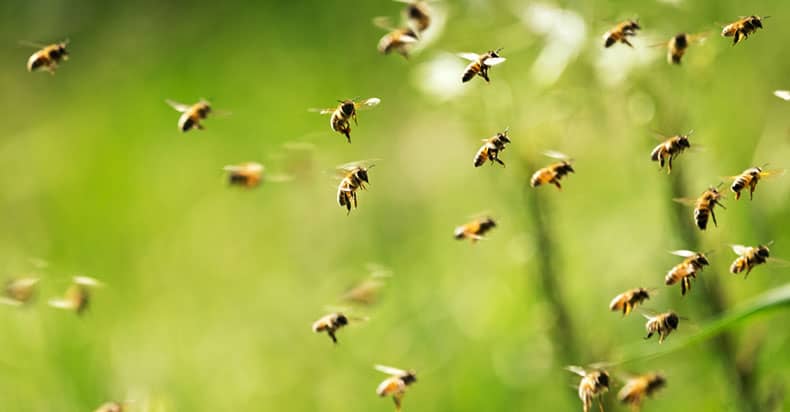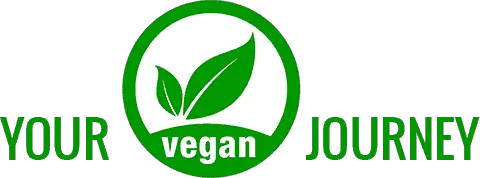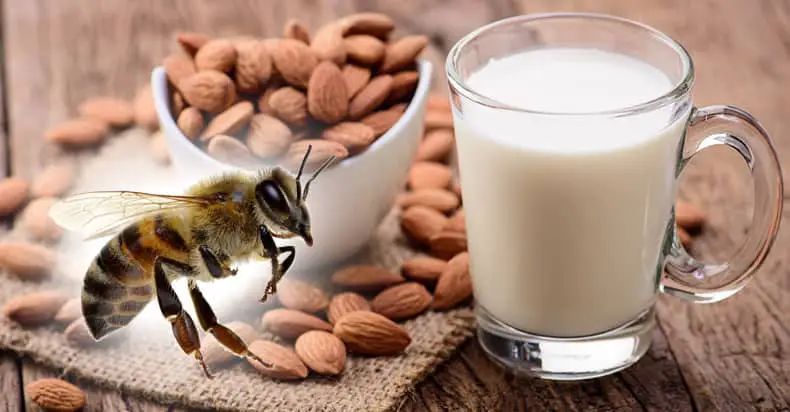In this article, we’ll be looking at whether almond milk should be considered suitable for the vegan diet. And if so, what factors need to be taken into consideration depending on whether you’re a vegan for ethical vs. health reasons, etc.
In short, is almond milk vegan? Yes, almond milk is considered vegan-friendly by most mainstream standards. While definitions of what constitutes a vegan can vary, the crudest definitions describe a strict vegetarian who abstains from animal products.1,2 By extension, vegan foods are those that are free of animal products.
Of course, the category of animal products includes byproducts as well.
What we’ll do now is look at why almond milk meets the basic requirements for what makes a food product vegan, and then we’ll discuss some of the counter-arguments and concerns levied by some in the vegan community.
Why Almond Milk Is Technically Considered Vegan
Almond milk meets the most basic definition for a vegan food product as it doesn’t contain animal products or derivatives.
Don’t let the word “milk” alarm you. In the case of plant milks, the specific crop (soy, cashew, almond, etc.) is soaked in water to allow some of the plant matter to leach into the aqueous medium forming a milk-like consistency.
Of course, store-bought plant milks also come with additives and preservatives.
On that note, it is true that some may contain animal-derived additives, but I’ve yet to come across any non-vegan ingredients in all my years of scanning almond milk labels.
Some almond milk is fortified with nutrients that could theoretically be derived from animals, so it’s a good idea to check the label to make sure. For example, if vitamin D is present, you’ll want to ensure that it’s in the form of vitamin D2.
Vitamin D3, or cholecalciferol, can be derived from non-animal sources (namely lichen), but vegan-friendly D3 is pretty rare and tends to be used in supplements more so than food.
Vitamin D2, or ergocalciferol, on the other hand, is obtained from exposing mushrooms to UV light, so it’s always considered vegan.
In my experience, D2 is the default form of the vitamin used in almond milk and other plant-based dairy substitutes.
For example, Blue Diamond Almond Breeze contains the almond milk itself (filtered water and almonds), cane sugar, calcium carbonate, sea salt, potassium citrate, sunflower lecithin, gellan gum, vitamin A palmitate, vitamin D2, and the natural form of vitamin E (D-alpha-tocopherol).3
Lecithin (an emulsifier) can be non-vegan, but it tends to be sourced from soy or sunflower. I’ve yet to see any non-vegan lecithin in almond milk. This one is easy to spot. As you can see, the description, in this case, states “sunflower lecithin.”
A gum will be present, usually gellan or locust bean, etc. Gums used as thickeners/stabilizers are derived from plants or produced bacterially, so they’re always vegan-friendly. That’s right, locust bean gum is not made of locusts.
Yes, you could nitpick some of the additives. For example, calcium carbonate while typically derived from geological sources can be obtained from eggshells, snail shells, and other biological materials, but these sources are less common.
Another example is vitamin A palmitate as it is derived from palmitic acid which can be animal-derived but is typically procured from palm oil.
Most vegans don’t stress too much when it comes to additives that can be vegan when sourced from x, but non-vegan when sourced from y.
If you are an especially prudent vegan and want to remove all doubt, you may want to make your own homemade almond milk.
It’s quick and easy and just requires two ingredients: water and almonds.
Why Some Consider Almond Milk Non-Vegan
Almond milk usually tops the list of vegan-friendly foods. But, for whatever reason, when you perform an internet search on the topic you’ll find countless articles claiming that it’s not. This can be confusing for some, especially those who are new to the vegan diet.
So, what’s with the wildly disparate opinions when it comes to the vegan status of almond milk and other plant-based food products?
As mentioned above, almond milk can be exonerated based on the standard vegan definition. But, there are countless definitions out there from various organizations and vegan influencers, and there is some disagreement even among the most reputable sources.
As long as there are numerous definitions of what constitutes a vegan food product, there will be numerous (and conflicting) statements and opinions regarding the suitability of specific food products.
For example, veganism is often defined as the practice of abstaining from animal product use and rejecting the commodity status of animals in general.4-6
A definition like that (specifically the latter part) leaves the door open to condemning pretty much any 100% plant-based product, even those that have traditionally been considered vegan staples.
Another confounding factor is that folks adopt a vegan diet for a variety of reasons. While I’d imagine that it’s not uncommon to be motivated by several concerns at once when following a vegan diet, certain issues are going to resonate more with some vegans than others depending on whether they identify as an ethical, health, or eco vegan.
For example, palm oil is perhaps one of the most controversial ingredients in the vegan community. Its cultivation has long been criticized for its detrimental effects on the environment, as it contributes to greenhouse gas emissions and the habitat loss of endangered species.
However, palm oil-containing food products (think Oreo’s) are still touted by major vegan organizations like PETA as being “accidentally vegan”.
While palm cultivation can have negative impacts, it’s still considered largely vegan.
What About the Honey Bees?

The main issue with almond milk for some vegans is that it involves the use of honeybees for pollinating the vast almond orchards that produce nuts used for almond milk. Bees have to be transported cross country in large numbers to fill the role.
It’s easy to understand how this could be problematic for many vegans. If one subscribes to definitions of veganism that stress the exploitation of animals in all forms, then it’s easy to see how almond milk would be considered off-limits.
But, the involvement of bees in the pollination of almonds does not render almond milk off-limits to most vegans in the community. In fact, some vegans have no issue with consuming honey.7
It really comes down to a personal decision and what you’re comfortable with.
I personally consume almond milk, because it’s among the best alternatives to dairy milk. And I’ve yet to come across any food product that can’t in some way be implicated as non-vegan by at least some definitions.
It’s like the Six Degrees of Kevin Bacon. Any food product under the sun can be traced back to a process that exploits animals. As vegans, we do the best that we can.
One thing that does bother me a little is the message it sends. I think that the movement is better off if we make the lifestyle accessible to most people.
If someone is researching the vegan diet for the first time and they perform a search for vegan foods and find that ALMOND MILK of all things is non-vegan it would probably make the prospect of adopting the vegan diet seem much less practical.
But, that’s just my opinion. And I’m sure that people who espouse the “almond milk is non-vegan” position are well-meaning.
Again, it really comes down to a personal choice.
Almond Milk Vs. Cow’s Milk for Vegans
Whether you identify as a health or ethical vegan, almond milk is a great alternative to cow’s milk for those on a plant-based diet.
I risk dating myself, but I remember a time when almond milk was a boutique product and hard to come by. Nowadays it is quickly replacing cow’s milk in the refrigerated aisle of supermarkets.
While it is not a great source of protein—as opposed to soymilk which is another good dairy alternative—some almond milk varieties come fortified with pea protein.
Protein or not, almond milk is lower in calories compared to cow’s milk (at least the no sugar added varieties). It’s also free of saturated fat and cholesterol, which can’t be said of dairy milk. Cow milk can be fat-free but it always contains cholesterol.
Also, dairy milk is known to raise insulin and IGF-1 both of which are implicated in the pathophysiology of certain chronic diseases.8
Conclusion
That pretty much sums it up. Almond milk is considered vegan by most standards.
But for those of you who are particularly prudent and want to avoid all potentially ambiguous ingredients, or prefer to avoid a crop that requires the conscription of honeybee labor, then you may want to opt for a different milk substitute.
If you prefer to avoid additives, but take no issue with almond cultivation, then making your own may be the best option.
But, no matter how strict you are, I think we can all agree that almond milk is far superior to cow’s milk both in terms of health and ethics.
Thanks for reading.
References
- Definition of Vegan, Merriam-Webster. https://www.merriam-webster.com/dictionary/vegan
- Vegan Definition, Oxford Learner’s Dictionaries. https://www.oxfordlearnersdictionaries.com/us/definition/english/vegan_1
- Smart Label Nutrition Data: Blue Diamond Almond Breeze, Almond milk, Refrigerated, Reduced Sugar, Original. https://smartlabel.labelinsight.com/product/4341416/nutrition
- Pedersen, Helena; Staescu, Vasile (2014). “Conclusion: Future Directions for Critical Animal Studies”. In Taylor, Nik; Twine, Richard (eds.). The Rise of Critical Animal Studies: From the Margins to the Centre. Routledge. pp. 262–276. ISBN 978-1-135-10087-2.
- Gary Steiner, Animals and the Limits of Postmodernism, Columbia University Press, 2013, https://books.google.com/books?id=SfFnIsnSEIQC&pg=PA206#v=onepage&q&f=false
- Gary Francione, “Animal Welfare, Happy Meat and Veganism as the Moral Baseline”, in David M. Kaplan, The Philosophy of Food, University of California Press, 2012 (169–189) 182.
- The Great Vegan Honey Debate. Is Honey the Dairy of the Insect World? Slate Magazine. https://slate.com/human-interest/2008/07/why-vegans-can-t-decide-whether-they-re-allowed-to-eat-honey.html
- BC Melnik, et al. Over-stimulation of insulin/IGF-1 signaling by western diet may promote diseases of civilization: lessons learnt from laron syndrome. Nutr Metab (Lond). 2011; 8: 41. https://www.ncbi.nlm.nih.gov/pmc/articles/PMC3141390/

